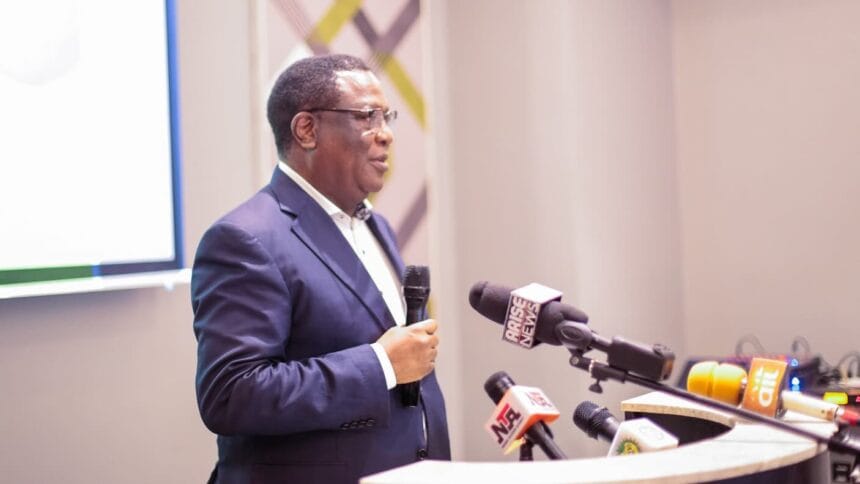… confirms Tinubu’s Presidential directives streamline oil and gas value chain, eliminate middlemen, cut contracting cycle to six months
Oredola Adeola
Engr. Felix Ogbe, Executive Secretary of the Nigerian Content Development and Monitoring Board (NCDMB) has pledged to revive the insurance services guidelines that the Board signed in collaboration with the National Insurance Commission (NAICOM) in June 2022.
The Executive Secretary of NCDMB gave this assurance among other issues discussed at the breakfast meeting organised by the Board for some media executives and energy correspondents in Lagos, on Monday.
Advisors Report’ check showed that the former ES, Simbi Wabote, and Sunday Thomas, Commissioner for Insurance, NAICOM, in June 2022, signed the guideline intending to address the loopholes that had been identified while implementing the provisions of the Nigerian Oil and Gas Industry Content Development (NOGICD) Act, particularly sections 49 and 50, which deal with insurance of oil and gas activities.
Those sections of the act required all operators engaged in any form of project in the oil and gas industry to insure all insurable risks related to its oil and gas business with an insurance company, through an insurance broker registered in Nigeria.

Engr. Felix Ogbe, Executive Secretary, NCDMB with the Director Corporate Services and Capacity Building; Mr. Abdulmalik Halilu; Director Projects Certification and Authorization, Engr. Abayomi Bamidele and Director, Legal Services, Mr. Naboth Onyesoh, Esq. Dr. Ama Ikuru, Director Monitoring and Evaluation, and other senior management of NCDMB that attended the breakfast meeting
Meanwhile the ES in his response to a question on insurance, promised to revive the insurance services guidelines Engr. Ogbe, confirmed that NCDMB had complied fully with the President Bola Tinubu’s Presidential Directive on Local Content Compliance Requirements, 2024 (EO 41), which sought to ensure that only local service companies that have domiciled proven capacities and capabilities can participate in oil and gas tenders.
He disclosed that it the Board had also contributed to shortening the oil industry contracting cycle to six months, courtesy of the three Presidential Directives on Local Content operations issued by President Bola Tinubu in March 2024.
He also indicated that NCDMB has reduced its touch points and fast-tracked projects approval processes, in compliance with the Presidential Directive on Reduction of Petroleum Sector Contracting Costs and Timelines, 2024 (EO 42).
The Presidential Directives and the Board’s compliance are geared to attract new international and local investments, encourage speedy development of oil and gas projects and improve the Nigerian economy.
The Executive Secretary hinted at plans to launch a major initiative tagged “Back to the Creeks.”
This policy will take the impact and contribution of local content implementation to oil-producing communities and other hinterlands across the country.
Responding to questions from journalists, the NCDMB boss dismissed insinuations that local content implementation increases the cost of producing crude oil in Nigeria.
He clarified that the major drivers of the increased cost of crude oil production are downtime and disruptions in operations caused by community issues or technical problems.
Other challenges responsible for extraneous costs include the cost of providing security and the activities of briefcase contractors, he said.
On the Board’s strategies for enabling the growth of the industry, Ogbe stated that NCDMB was working intently to create an enabling environment for international oil companies to make final investment decisions for new projects and was evolving policies to support indigenous oil and gas service companies.
Responding to a question on insurance, the NCDMB boss promised to revive the insurance services guidelines the Board signed in June 2022 with the National Insurance Commission (NIACOM), which would oblige the Nigerian oil and gas industry to patronize the local insurance sector.
He acknowledged that the success of the Nigerian Oil and Gas Industry Content Development (NOGICD) Act and the Nigerian Content 10-year strategic roadmap depends largely on public communication, awareness, and support from key oil and gas stakeholders.
He also appreciated the media for projecting the activities and programmes of the Board and assured that cooperation with the media would be deepened under his leadership as the Executive Secretary.
Mr. Esueme Dan Kikile, General Manager, Corporate Communications and Zonal Coordinationindicated that the breakfast meeting was organised to introduce the Executive Secretary formally to leading media stakeholders.
Other senior management of NCDMB that attended the breakfast meeting included the Director Corporate Services and Capacity Building; Director Monitoring and Evaluation, Mr. Abdulmalik Halilu; Director Projects Certification and Authorization, Engr. Abayomi Bamidele and Director, Legal Services, Mr. Naboth Onyesoh, Esq.
Dr. Ama Ikuru, Director Corporate Services and Capacity Building, in his comments, charged media stakeholders to report Nigeria in a positive light, to attract investments in the oil and gas sector.
Mr. Abdulmalik Halilu, Director of Monitoring and Evaluation, in his intervention, gave an update on the performance of the Nigerian Content Intervention Fund (NCI Fund). He rated the Fund’s performance as over 90%, judging by the percentage of access by qualified companies and repayment by the borrowers.
Halilu equally hinted that the Executive Secretary had constituted a team to review the Community Contractors Fund, which is a poor performing product under the Nigerian Content Intervention Fund (NCI Fund).
The NCDMB’s Director of Monitoring and Evaluation also expressed hope that an announcement would soon be made on the remodeling of that particular product, new partners, and product papers.
Engr. Abayomi Bamidele, Director of Projects Certification and Authorization, highlighted the increased number of projects approved by the Board since it started implementing the Presidential Directive on Local Content.
He added that the Board was equally supporting companies seeking to fast-track gas investments to take advantage of the Presidential Directive on Tax Incentives, Exemptions, and Remissions for the Oil and Gas Companies.
Also speaking, Director, Legal Services, Mr. Naboth Onyesoh commended the media for their support to the Board over the years, which increased the visibility and public awareness of the Board’s functions and achievements.




